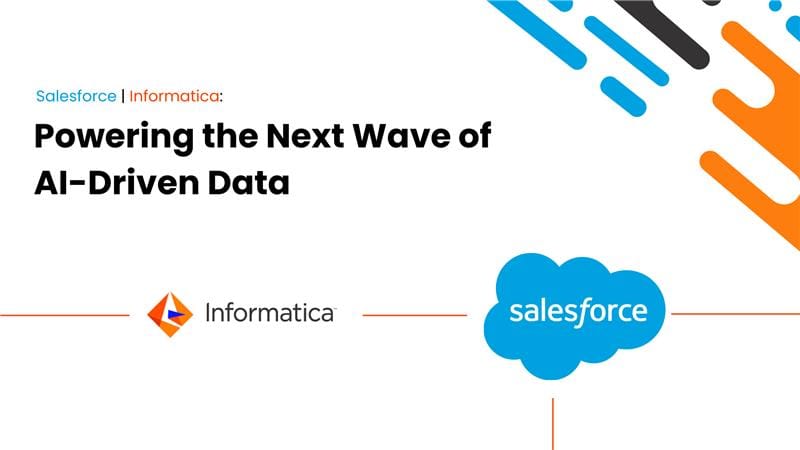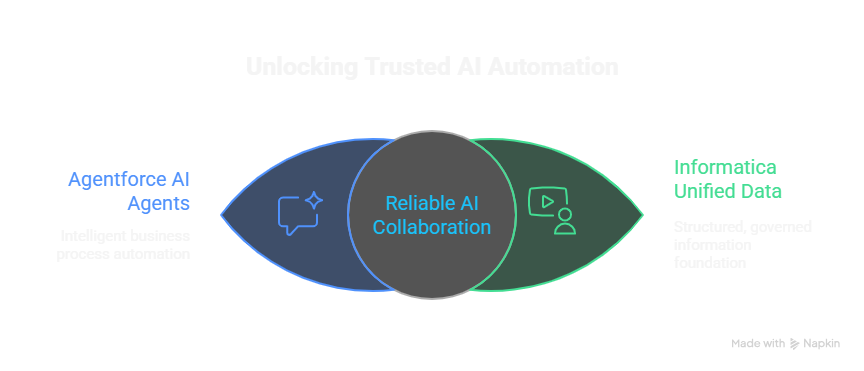Beyond CRM: How Salesforce’s Informatica Integration Will Redefine Enterprise Data and AI Strategy
CRM Meets Data Intelligence

Introduction: Salesforce’s AI Pivot Enters a New Phase
For years, Salesforce has been synonymous with customer relationship management. But in 2025, the company’s ambitions extend far beyond CRM. The recent acquisition of Informatica, a global leader in enterprise data management and governance, marks one of Salesforce’s most strategic moves to date.
This deal signals Salesforce’s transformation into an AI-first, data-centric platform—where customer experiences, analytics, and decision-making all converge on a unified foundation of trusted, compliant data.
As organizations accelerate AI adoption, this integration aims to solve one of the most persistent barriers to success: fragmented, ungoverned, and siloed data.
The Data Problem Enterprises Still Face
Despite years of digital transformation, most enterprises still operate with disconnected data systems spread across multiple clouds and legacy platforms.
Common challenges include:
- Data silos that prevent teams from accessing a single view of customers or operations.
- Inconsistent governance frameworks leading to duplication, compliance risks, and unreliable reporting.
- Manual data processes that slow down AI readiness and decision cycles.
- Security vulnerabilities when integrating multiple unregulated data sources.
In short, many organizations have data—but not intelligence. Salesforce’s acquisition of Informatica directly addresses this by unifying data integration, quality, and lineage under one ecosystem.
Why Informatica?
Informatica brings decades of experience in data integration, metadata intelligence, and governance—capabilities that align perfectly with Salesforce’s evolving AI architecture.
1. Data Integration Across Ecosystems
Informatica’s connectors can ingest and harmonize data from virtually any source—on-premises systems, cloud warehouses, APIs, and third-party SaaS tools. This complements Salesforce’s Data Cloud, enabling organizations to unify structured and unstructured data from across their tech stack.
2. End-to-End Data Governance
Informatica offers powerful metadata management, allowing enterprises to trace how data flows across systems. This ensures regulatory compliance, auditability, and data accuracy—essentials for industries like finance, healthcare, and manufacturing.
3. AI-Ready Data for Einstein and Agentforce
AI models are only as effective as the data they rely on. Informatica strengthens Salesforce’s Einstein 1 Platform and Agentforce by ensuring that AI agents and predictive models are fed with clean, contextual, and governed data. This makes AI-driven workflows more reliable and explainable.
4. Scalability and Multi-Cloud Flexibility
The integration also simplifies cross-cloud data movement, enabling organizations to connect Salesforce with AWS, Azure, Google Cloud, SAP, and Oracle infrastructures. This hybrid capability is vital for enterprises that need to modernize gradually without disrupting existing environments.

The Broader Strategy: From CRM to Enterprise AI Platform
Salesforce’s acquisition of Informatica represents a structural shift in how enterprise systems will operate. Instead of existing as a customer-facing application, Salesforce is evolving into a data operations and intelligence layer—an orchestration point between business data, AI agents, and user interactions.
This mirrors a broader industry trend: Organizations are no longer building AI systems on top of data—they’re embedding AI within their data ecosystems.
Salesforce’s advantage lies in its ability to unify AI, CRM, and data governance within a single platform—something competitors like Microsoft or SAP have yet to fully achieve.
Anticipated Benefits for Enterprises
1. Single Source of Truth
By connecting all data sources into Salesforce Data Cloud through Informatica, enterprises gain a 360° view of customers, partners, and operations. This consistency fuels better analytics, targeted personalization, and AI-driven insights.
2. Faster Time to Insight
Governed and automated pipelines reduce time spent on manual data preparation. Teams can focus on decision-making rather than cleansing or reconciling datasets.
3. Enhanced Security and Compliance
Informatica’s lineage tracking and role-based access controls ensure organizations can meet evolving data privacy laws (GDPR, CCPA, HIPAA) while maintaining agility.
4. Smarter AI Models
Reliable, well-labeled data leads to more accurate predictions and lower bias in AI-driven processes—critical for use cases like predictive sales forecasting, fraud detection, and patient outcome prediction.
5. Operational Efficiency
Automated data synchronization between Salesforce and external systems reduces maintenance overhead and lowers total cost of ownership.

Industry Use Cases: What Changes in Practice
1. Automotive and Manufacturing
In automotive supply chains, data lives across dealer networks, warranty systems, and logistics platforms. With Informatica-powered Data Cloud integration, manufacturers can merge service records, sensor data, and customer interactions—enabling predictive maintenance and AI-driven warranty optimization.
2. Healthcare and Life Sciences
Healthcare organizations rely on diverse systems (EHRs, insurance platforms, patient portals). Unified data governance allows for HIPAA-compliant patient 360° views, improving engagement, appointment scheduling, and treatment personalization—all within Salesforce Health Cloud.
3. Financial Services
Banks and insurers face heavy data regulation. Informatica integration enables financial firms to link Salesforce with core systems while maintaining lineage, ensuring that AI models for fraud detection or credit risk operate only on verified, compliant data.
4. Retail and Consumer Goods
Retailers can merge loyalty, transaction, and supply chain data into a single cloud fabric—allowing AI agents to deliver real-time personalization, dynamic pricing, and inventory optimization.
Governance and Ethics in an AI-Driven Ecosystem
One of the most profound implications of the Salesforce–Informatica union is its potential to establish AI governance standards within enterprise environments.
With AI systems increasingly involved in sensitive decision-making, businesses need:
- Traceable data origins (to verify how AI reached a conclusion).
- Ethical oversight of how models use customer or operational data.
- Auditable frameworks to demonstrate regulatory compliance.
Informatica’s metadata and lineage capabilities offer the transparency needed to make AI both explainable and accountable—two principles that are becoming central to global AI governance regulations.
The Infrastructure Foundation: Hyperforce and Data Cloud
Salesforce’s Hyperforce architecture—its global, multi-region infrastructure—plays an essential role in this evolution. With Informatica, Hyperforce gains new data integration and compliance layers that enable region-specific data residency and scalability for large AI workloads.
When paired with Zero Copy Integration (Salesforce’s framework for accessing external data without duplication), Informatica’s capabilities allow organizations to query and act on data in place, reducing cost, latency, and security risks.
The Role of Agentforce and AI-Native Applications
Agentforce, Salesforce’s AI agent framework, stands to benefit significantly from this merger. As AI agents handle increasingly complex business processes, they require real-time access to structured and governed information.
With Informatica unifying and cleaning that data, Agentforce agents can:
- Resolve service cases autonomously using verified data.
- Generate accurate insights for sales or marketing teams.
- Comply with industry-specific policies in regulated workflows.
The result is a more reliable and trustworthy layer of automation, where AI agents act not as chatbots but as intelligent collaborators.

Potential Challenges and Considerations
While the integration promises transformative benefits, organizations must also prepare for practical challenges:
- Complexity of Migration: Harmonizing legacy systems requires careful sequencing and change management.
- Governance Overload: Enterprises must balance flexibility with compliance when defining access rules.
- Skill Gaps: AI and data governance expertise remain scarce, potentially slowing adoption.
- Cost Control: Unified platforms can reduce redundancy, but initial setup and licensing require strategic planning.
These factors highlight the need for strong internal data strategy teams to guide implementation.
The Road Ahead: From AI Adoption to AI Governance
The Salesforce–Informatica acquisition isn’t just about integrating software—it’s about reshaping how enterprises think about AI. Over the next few years, expect to see Salesforce evolve into the operating fabric for enterprise intelligence—where every customer interaction, decision, and prediction is grounded in governed, real-time data.
Predictions for 2026 and beyond:
- AI Agents Become Default: Agentforce and Einstein evolve from optional tools to core operational systems.
- Data Cloud as the AI Control Plane: Data governance becomes the foundation of all automation.
- Multi-Cloud Normalization: Integration patterns expand across GCP, AWS, and Azure through Informatica connectors.
- AI Regulation Compliance: Enterprises leverage Salesforce for transparent, explainable AI reporting.
This is a defining moment for the enterprise technology ecosystem—where data, AI, and trust converge.
Conclusion: A Redefined Future for Data-Driven Enterprises
Salesforce’s acquisition of Informatica is more than a business deal—it’s a signal of where enterprise technology is heading. The integration brings together the front-end intelligence of CRM and AI agents with the back-end integrity of data management and governance.
As organizations increasingly depend on AI to drive value, the ones that succeed will be those that build on clean, transparent, and compliant data foundations. This merger lays the groundwork for that future—one where CRM, AI, and data are no longer separate disciplines but part of a single, intelligent ecosystem.
The age of data-driven, AI-native enterprises has begun—and Salesforce is positioning itself at its center.

FAQ's
1. What is the goal of Salesforce’s acquisition of Informatica?
To combine Salesforce’s AI with Informatica’s data tools for unified, AI-ready enterprise data.
2. How will Informatica strengthen Salesforce Data Cloud?
It adds data integration, quality, and lineage features for secure, connected data across clouds.
3. Why is governed data important for AI success?
Governed data ensures AI models use accurate, compliant, and trustworthy information.
4. What industries benefit most from this integration?
Healthcare, finance, manufacturing, and retail gain faster insights and stronger compliance.
5. How does this integration change the future of CRM?
CRM evolves into an AI-driven data platform, powering real-time, intelligent decisions.

